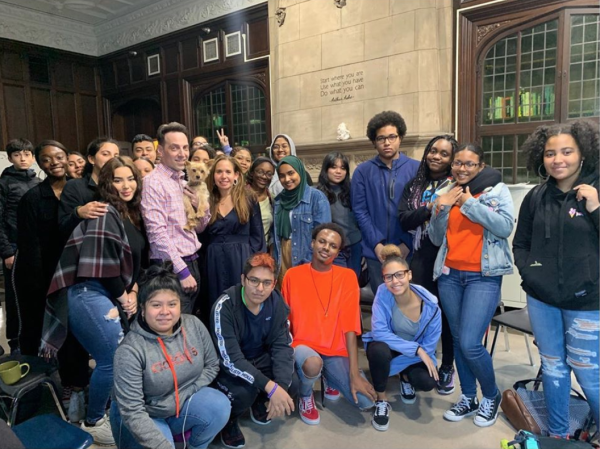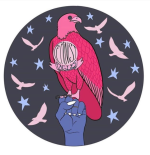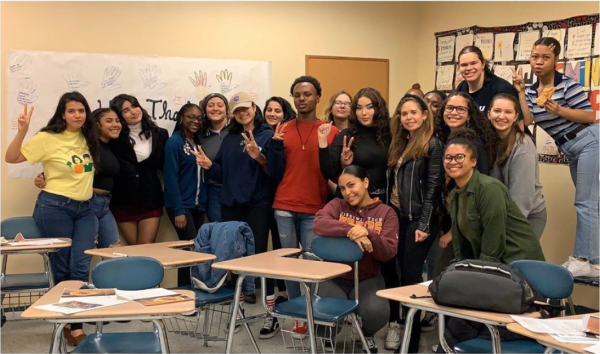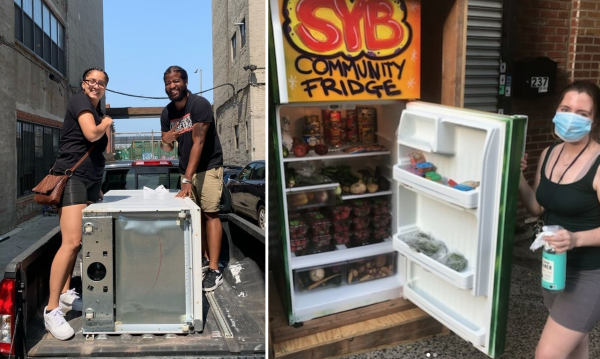Creating Meaningful Connections With School Clubs, Even During Online Learning
This guest post is by Sari Beth Rosenberg, Shelburne Farms Fellow and history teacher at the High School for Environmental Studies in New York City.
Clubs have always been a critical venue for students to build confidence, form peer relationships, find their individual and collective voices, and feel empowered by taking actions. These learning goals are front and center when we talk about education for sustainability, too. And of course, many clubs explore themes of sustainability, either directly or indirectly. The Feminist Eagles Club, for example, implicitly addresses one of the U.N. Sustainable Development Goals: Gender Equality.
So how can clubs foster student voice, and how do we maintain their vibrancy for students through this pandemic?
I have been teaching for eighteen years at the High School for Environmental Studies in New York City. When we went fully remote in March, I, along with several colleagues who also lead clubs at my school, attempted to keep the momentum going online. Dedicated to creating the best possible online club experience for students, this fall I also spoke with two other educators, Andrew Margon (teacher facilitator of the Green Team) and Hector Gerardo (co-founder of 1Freedom For All) about their experiences and plans for organizing their clubs during remote learning.
Feminist Eagles
The Feminist Eagles was founded in 2015 by a small group of students, Mr. Alex Marx, and me. Since then, our feminist club has become a weekly safe space for students. We discuss all topics and issues related to intersectional feminism and social justice. What makes the club special is that it is student-led, except for an occasional guest.
"Being a part of feminist club for me has been a form of empowerment. You learn not only about yourself but also find a safe space in which you can grow and become stronger alongside other girls like yourself. Ultimately, feminist club is a sisterhood. Together we are not only stronger, but we are also empowered to speak up for ourselves, our values, each other, and for others!"
- Yosely Jimenez (1 of the 4 new leaders of the Feminist Eagles)
When the global pandemic shut down school, students were overwhelmed adjusting to remote learning, so I gave them time to acclimate before pushing for a club meeting. I continued to communicate via Google Classroom and an Instagram account that I’d been maintaining for the club since its early days. Still, it was difficult to get club students organized to actually meet on Zoom.
But when we finally met for a couple of Fridays, it was so valuable. Some students had been feeling alienated and disconnected from their peers due to remote learning. And in addition to the global pandemic, the streets had exploded in protest in response to the police murder of George Floyd. During these two meetings, there was no structure imposed or planned topic. Students just used the time to talk about the protests and their anxieties and stresses related to quarantine, Covid-19 and remote learning.
This fall, I turned the club’s reins back to the students. Here are the five seniors who are leading the “Feminist Eagles, the remote edition” this year. They’ve been great! Together with our school’s Student Council, the Feminist Eagles have been informally meeting for weeks with the founders of Prom at the Polls. This nonpartisan, grassroots organization is encouraging young people to vote by having students dress up in their prom outfits (the ones they didn’t get to wear last spring!), and make a video “prom-polls-al” asking someone to vote with them. Connecting with an established organization on such a timely topic has been a great strategy to galvanize our club remotely.
The Green Team
Andrew Margon, another Shelburne Farms Fellow/alum, is the teacher facilitator of the Green Team club, which supports students in identifying sustainability-related problems that they are passionate about, and developing projects to address them. Students cook together, build community, and have fun!
In years past, they would, as Margon explained to me, “go back and forth between cooking and eating together, and working on school projects such as making a video or planning events to encourage the school community to compost and sort waste more consistently.” For example, one week they were eating and making a student's mom's tamale recipes and the following week, planning for a takeover of the cafeteria to promote a composting competition.
When school went remote, the Green Team also struggled with the transition, and had less of an online presence than the Feminist Eagles (which he’s hoping to change this academic year). Still, his advice for setting up clubs--online or not--is to provide the meeting schedule ahead of time, stick to it, and make it fun. He also suggests asking students what they want to accomplish in the club and spending your energy as an educator helping them bring their goals to life.
Margon linked up with 1Freedom, an organization that works with youth in New York City public schools to bring food justice and racial equity to their school communities and neighborhoods. Co-founded by Hector Gerardo and Elizabeth Guerra, 1Freedom formed a student club in partnership with HSES, and club activists created a "Student Bill of Rights,” demanding “access to quality, nutritious, locally-sourced/prepared school meals, clean (free) water; a seat at the table where decisions that impact the student body are being made; a rooftop greenhouse as a mechanism that can be used to incorporate restorative justice practices at their school; and students learning how to grow their own food in an urban area.”
When school went online, it did not stop 1Freedom. This summer they offered a 4-week youth leadership program, the Summer Youth Brigade, for high school-aged activists committed to creating healthy and safe environments. Margon steered some of the Green Team students to the Brigade, and supported 1Freedom’s fundraising campaign to hire young people to lead mutual aid initiatives in their respective neighborhoods while also learning leadership development. This included setting up — and stocking up — community refrigerators in under-resourced neighborhoods in New York City.



